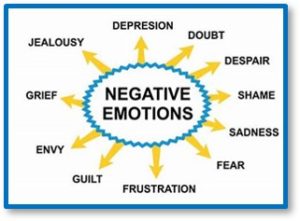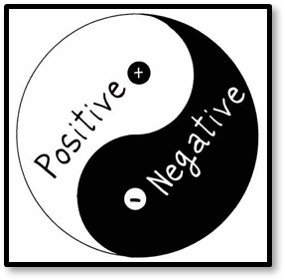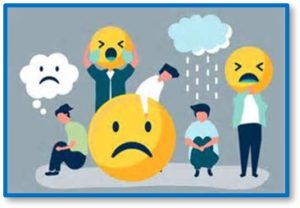Monday Author: Susanne Skinner
“It is not a person or situation that affects your life; it is the meaning you give to that person or situation, which influences your emotions and actions. Your choice is to change the meaning you gave it or to change your response to create the outcome you want.”
~ Shannon Alder
Life is a balancing act and negative emotions come with the territory. They are powerful, scary and damaging, but with the right perspective, they are normal. We think of ourselves as rational beings but emotions — positive and negative –drive our decisions.
 Positive emotions are easily identified but their negative counterpoints share equal influence in the way we think, act and feel. Negative emotions are natural emotions, including hate, anger, jealousy and sadness. In the right context, they inspire and influence positive behavior. The wrong context robs enthusiasm and joy from daily living, making us toxic to ourselves and others.
Positive emotions are easily identified but their negative counterpoints share equal influence in the way we think, act and feel. Negative emotions are natural emotions, including hate, anger, jealousy and sadness. In the right context, they inspire and influence positive behavior. The wrong context robs enthusiasm and joy from daily living, making us toxic to ourselves and others.
When negative emotions take over, they begin to outline and define who we are. They develop sharp edges and live in dark places. When we lose perspective and live into the negative, we lose the ability to re-balance ourselves.
Negative is Normal
Somewhere along the way negative emotions became a bad thing. We live in a social media world of positive affirmation. Podcasts, Ted Talks and memes encourage us to live in the moment with gratitude and appreciation. I try to do this every day, looking for the good and focusing on the positive.
But negative happens. If we deny it or ignore it, we are doing ourselves a disservice. Negative emotions are part of being human. They come and they go. Not talking about them means avoiding a part of living that belongs to everyone. Eventually they force themselves on us and we end up feeling even worse. It’s part of being human.
At their best, negative emotions are warning signs. They signal something is out of balance or not working; telling us to pay attention because we are out of balance.
Not all emotions are extreme. There is a middle ground where frustration, annoyance, and stress live. These are warning signs, and ignoring them allows mild emotions to grow into stronger versions of themselves. Fear, anger and resentment are louder warning signals that spiral out of control when ignored. Side effects include anxiety, depression, and rage, manifesting the conflict between our beliefs and reality. We see only what we want to see and remember only what we want to remember, prolonging the negative feelings.
The Positive Side of Negative Emotions
I am both a glass-half-empty and glass-half-full person. Either way, I see additional capacity. If the glass is half empty, there is room for more. When it is half full, there is always something to be grateful for as well as something to share.
 Understanding that every action is driven by an emotion underscores our ability to filter and get through difficult situations without letting negative emotion get the upper hand.
Understanding that every action is driven by an emotion underscores our ability to filter and get through difficult situations without letting negative emotion get the upper hand.
Finding inspiration within a negative context begins by acknowledging that negative emotions are normal emotions.
- They serve as a warning, with positive intention
- They motivate and inspire action
- They build resilience
- They expand possibilities
- They are an emotional release
- They remind us of our humanness
Practicing Behaviors
When we become accepting, tolerant and understanding of our own emotions we gain flexibility and control over ourselves and our response to others. It’s a conscious effort, underwritten by some practiced behaviors:
- Don’t blow things out of proportion
- Be reasonable
- Think rationally
- Accept that bad feelings happen
- Know how to make yourself feel better
- Learn the emotions or events that trigger negative feelings.
- Exercise — activity lowers stress chemicals
- Let go of the past.
Provide space within yourself for life to be challenging. Learn to acknowledge and understand what negative emotions are trying to tell you and control the power they have to define you.
When Negative is Not Normal
Unchecked negative emotions unbalance us, skewing our ability to see a situation in its true perspective. They influence our judgement, cloud our thinking and take control of our lives. When that happens, anger, grief, depression prevents us from enjoying life.
 The longer they continue, the more entrenched negative emotions and problems become, eventually becoming the new reality. Anger and resentment create collateral damage
The longer they continue, the more entrenched negative emotions and problems become, eventually becoming the new reality. Anger and resentment create collateral damage
Dealing with negative emotions inappropriately can be dangerous and harmful — for you and for others. When anger turns to violence it signals loss of control. When bitterness replaces understanding and forgiveness, our hearts and minds are closed to any other emotion. A charitable heart goes a long way in neutralizing the negative.
The High Road
Everyone knows someone living life in a negative space. Once you see the negative, it becomes difficult to find the good. Don’t let their problems becomes yours, and don’t allow their negativity to cast a shadow on your happiness.
 Much of our own happiness is dependent upon relationships. When others are kind to you it makes you happy. When they abuse the relationship, you become unhappy. We can have compassion for them while taking responsibility for our own happiness. Dealing with negative emotions (in ourselves as others) requires a high level of maturity. We can’t always avoid these people, but we can distance ourselves and reserve judgement.
Much of our own happiness is dependent upon relationships. When others are kind to you it makes you happy. When they abuse the relationship, you become unhappy. We can have compassion for them while taking responsibility for our own happiness. Dealing with negative emotions (in ourselves as others) requires a high level of maturity. We can’t always avoid these people, but we can distance ourselves and reserve judgement.
Like attracts like. The people and situations in our lives mirror our own state of being. When you project unhappiness, suddenly you see unhappy people. Negative perception seeks like-minded thinking. It’s easy to find “life sucks” corroboration by sending out negative energy. It will find you.
No one ever regrets taking the high road
Seek the Good
Look for it first in yourself, and suddenly you will see it in others. Spread good energy. You reflect who you are inside. Negativity will always knock on your door, but you don’t have to let it in.
